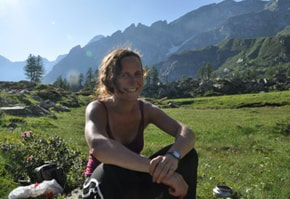Verena Seufert

I am a geographer-ecologist interested in all things food and nature. Food for me is what connects us in the most fundamental ways with nature. We depend on ecosystems, and we impact ecosystems through the way we produce, prepare and eat our food. We need water to irrigate our fields, bees to pollinate our orchards, soil to root our crops, and air to allow cattle to breathe and crops to grow. What we eat also defines us as societies and as individuals. Food defines our health, our cultures, our communities, and it defines our environmental footprint. Right now there are many things that are wrong in the way we grow and eat our food. The fertilizer we use pollutes our rivers, lakes and oceans, the land we use for agriculture destroys forests and wetlands, the tractors we use compact our soils, the pesticides we apply kill beneficial plants and insects. While the food we eat often makes us sick and obese, or does not provide sufficient nutrients to allow our children to grow healthily.
I am interested in understanding how to do food better: How can we create a world where everyone has sufficient and nutritious food they enjoy eating? How can we produce our food without destroying the very natural resources that food production depends on? How can we create a food system that is more just and more sustainable?
There are many purported answers to these questions out there. Paleo! Organic! GMO! Vegan! Local! Global! But what do we actually know about these supposed solutions? Debates around these issues are often very passionate, but typically not sufficiently informed by good science. In my research I try to assess these debates as objectively as I can, using rigorous scientific tools, to help us make sense of different claims, and in the end to allow us to grow and eat food in a better way.
See Verena's website
Selected publications
Martellozzo, F., Landry, J.-S., Plouffe, D., Seufert, V., Rowhani, P., Ramankutty, N. 2014. Urban agriculture: a global analysis of the space constraints to meet urban vegetable demand. Environmental Research Letters 9, 064025. doi:10.1088/1748-9326/9/6/064025
Seufert, V., Ramankutty, N. & Foley, J. A. 2012. Comparing the yields of organic and conventional agriculture. Nature 485, 229-232. doi:10.1038/nature11069
Seufert, V., Linden, B. & Fischer, F. 2010. Revealing secondary seed removers: results from camera trapping. African Journal of Ecology 48, 914-922. doi:10.1111/j.1365-2028.2009.01192.x
More about Verena
I am interested in understanding how to do food better: How can we create a world where everyone has sufficient and nutritious food they enjoy eating? How can we produce our food without destroying the very natural resources that food production depends on? How can we create a food system that is more just and more sustainable?
There are many purported answers to these questions out there. Paleo! Organic! GMO! Vegan! Local! Global! But what do we actually know about these supposed solutions? Debates around these issues are often very passionate, but typically not sufficiently informed by good science. In my research I try to assess these debates as objectively as I can, using rigorous scientific tools, to help us make sense of different claims, and in the end to allow us to grow and eat food in a better way.
See Verena's website
Selected publications
Martellozzo, F., Landry, J.-S., Plouffe, D., Seufert, V., Rowhani, P., Ramankutty, N. 2014. Urban agriculture: a global analysis of the space constraints to meet urban vegetable demand. Environmental Research Letters 9, 064025. doi:10.1088/1748-9326/9/6/064025
Seufert, V., Ramankutty, N. & Foley, J. A. 2012. Comparing the yields of organic and conventional agriculture. Nature 485, 229-232. doi:10.1038/nature11069
Seufert, V., Linden, B. & Fischer, F. 2010. Revealing secondary seed removers: results from camera trapping. African Journal of Ecology 48, 914-922. doi:10.1111/j.1365-2028.2009.01192.x
More about Verena

